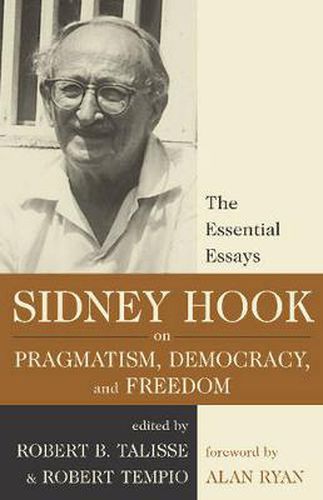Readings Newsletter
Become a Readings Member to make your shopping experience even easier.
Sign in or sign up for free!
You’re not far away from qualifying for FREE standard shipping within Australia
You’ve qualified for FREE standard shipping within Australia
The cart is loading…






Sidney Hook is arguably America’s most controversial intellectual. After beginning his career as this nation’s foremost Marxist scholar, he became in the late 1930s the leading anticommunist intellectual and defender of freedom against all forms of totalitarianism. This volume collects twenty-five of Hook’s most incisive essays in political philosophy. Clustered into five main sections, the essays discuss pragmatism and naturalism, Marx and Marxism, Democratic theory and practice, and the defence of a free society. In an insightful introduction, editors Talisse and Tempio argue that underlying the wide range of subjects covered by Hook was his unwavering commitment to the method of intelligence, which contends that any proposal, whether scientific, moral, or political, must be treated as a hypothesis to be confirmed or unconfirmed by the experimental evidence and deliberation of an unfettered community of inquiry. The editors place this methodology at the core of all of Hook’s philosophical and political work. This excellent collection makes a superb introduction to the thought of a leading intellectual who for too long has been neglected by mainstream American philosophy.
$9.00 standard shipping within Australia
FREE standard shipping within Australia for orders over $100.00
Express & International shipping calculated at checkout
Sidney Hook is arguably America’s most controversial intellectual. After beginning his career as this nation’s foremost Marxist scholar, he became in the late 1930s the leading anticommunist intellectual and defender of freedom against all forms of totalitarianism. This volume collects twenty-five of Hook’s most incisive essays in political philosophy. Clustered into five main sections, the essays discuss pragmatism and naturalism, Marx and Marxism, Democratic theory and practice, and the defence of a free society. In an insightful introduction, editors Talisse and Tempio argue that underlying the wide range of subjects covered by Hook was his unwavering commitment to the method of intelligence, which contends that any proposal, whether scientific, moral, or political, must be treated as a hypothesis to be confirmed or unconfirmed by the experimental evidence and deliberation of an unfettered community of inquiry. The editors place this methodology at the core of all of Hook’s philosophical and political work. This excellent collection makes a superb introduction to the thought of a leading intellectual who for too long has been neglected by mainstream American philosophy.